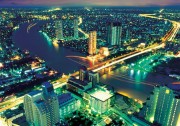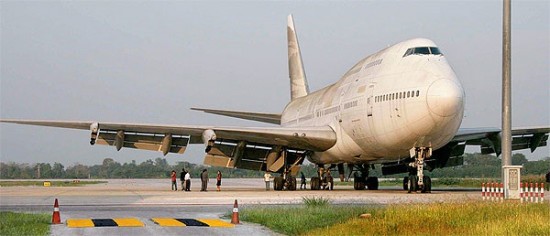 Views from Bangkok
Views from Bangkok
Kriminalität und Kriminalität sind unterschiedliche Dinge, wichtig ist, WER kriminell ist. Bei uns und in Thailand —- Christopher G. Moore aus Bangkok
(Übersicht der bisherigen Teile.)
CRIME AND CLASS
It’s all in the fine print
Like most economic activities in life the opportunity available is often linked with class. This is true in legal transactions. The acquisition and merger deals aren’t being conducted by people living in walkup projects in the Bronx or those living in the middle-class ‘burbs. Big deals are reserved for the big boys.
 It comes as little surprise that criminal activity mirrors the (so-called) non-criminal activity. Think of investment bankers plundering pension funds, 401k plans, and small investors—the high-return-with-no-risk crowd. Blended mortgage securities are about intangibles that no one understands or can explain. You drop in an apple, mix in some carrot juice, a splash of milk, some rotten banana (no one will know), a little hot sauce, and some Red Bull and stir: then sell that smoothie to a thirsty crowd. If that had been a drink, you’d be frog-marched to prison. But if it’s just a bunch of legal documents, and no one really knows the formula, then everyone gets a free pass. They walk because it’s all in the fine print—the clauses in .6 font size that no one understands until disaster strikes and suddenly clarity reigns and the people with the windfall walk clear of the wreckage.
It comes as little surprise that criminal activity mirrors the (so-called) non-criminal activity. Think of investment bankers plundering pension funds, 401k plans, and small investors—the high-return-with-no-risk crowd. Blended mortgage securities are about intangibles that no one understands or can explain. You drop in an apple, mix in some carrot juice, a splash of milk, some rotten banana (no one will know), a little hot sauce, and some Red Bull and stir: then sell that smoothie to a thirsty crowd. If that had been a drink, you’d be frog-marched to prison. But if it’s just a bunch of legal documents, and no one really knows the formula, then everyone gets a free pass. They walk because it’s all in the fine print—the clauses in .6 font size that no one understands until disaster strikes and suddenly clarity reigns and the people with the windfall walk clear of the wreckage.
The fine print is what makes high-class crimes far easier to get away with. It is hard to tell who committed it, how they did it, and exactly what was the crime. All that remains in these high-class scams are victims on one side and the suits on the other side, saying it wasn’t them that did anything wrong. It was the market that caused the melt down. If you are a sucker for the securities in the first place, there’s no indication you won’t be a sucker for criminals usual defense. Blue-collar crime has no contract coverage. It’s more grab and snatch and run like hell.
 In the lower classes the criminal says: “I don’t know nothin’ about nothin’.”
In the lower classes the criminal says: “I don’t know nothin’ about nothin’.”
In the high status criminal case involving big ticket items, there is a variation of this old, familiar defense: “There are known knowns, and unknown knows, and unknown unknows and this loss unfortunately fell into the latter category and we are investigating whether research will allow us to elevate the problem at least to the unknown knows.”
This allows us to draw a conclusion that the degree of ambiguity and confusion rises exponentially according to the magnitude of the crime and the status of the criminal. The bigger the crime, the higher the status of the criminal, the higher the possibility that not only will no criminal charges be brought but that the government will foot the bill to clean up the damage caused. The bigger the potential crime, the more money spent on lawyers to divert any dodgy actions into the fine print.
It is the difference between stripping your rental car and hauling off the engine and parts and stripping a couple of rented Boeing 747. These activities are worlds and classes apart. One tip off is with the possibility of big crimes at stake, it is always wise to preface things with “allegedly”—lawyers use this as their way of saying it might or might prove to be true. An example of the distinction in small and big crime stories appeared in the news this week.

What you are looking at is a Boeing 747 parked on a runway in Phitsanulok, Thailand. Phitsanulok is like the Kansas of Thailand. You really need relatives living there or a business reason to go.
The plane is said to ‘belong’ to Orient Thai Airways. If you look closely at the photograph, you’ll notice something is wrong. Where are the engines? That’s what the Thai police are asking according to the Bangkok Post.

Apparently there were two such aircraft involved.
Not that those two parked aircraft was a highly guarded secret. The two Boeing 747s parked at Phitsanulok Airport are noted in the Wikipedia entry for the airport.
In executing this, on the surface, perfect crime, the thieves just didn’t steal the engines—that takes some bit of know-how and special tools—they brought along not a gunmen or getaway driver, but a painter. Not to mention they had a nerd who reads Wikipedia with the mission to find airplanes at obscured airports in Asia. After allegedly stealing the engines from the plane, they repainted the body of the 747. It seems it was quite a good paint job as no one seems able to scratch off the paint to read the country of origin and Boeing manufacturer’s numbers.
Exactly why was the plane parked out in the boondocks? It seems the airline didn’t want to cough up the parking fee at Suvarnabhumi Airport—the name of the airport most people land and depart from when coming to Bangkok.
No one has done the math on this one. But I suspect the cost of the engines and other parts exceeded by a fairly large margin the difference in parking fees. No one has asked anything about the security arrangements—CCTV cameras, that kind of thing—at Phitsanulok airport. With lower parking fees, maybe that is not part of the deal. You park and pray no one steals your engines. But the police have as yet charged anyone. They have, though, come up with a motive: the engines were stolen to resell. Like car parts from dodgy vendors, second-hand airplane engines apparently have a market. Don’t you just love capitalism and the innovative ways the parts, products and services are never wasted, only recycled back into the system? The second theory planned by an informant along the lines that the planes were involved in illegal activities. What might that encompass? The police think it could be tax evasion.
This all looks like serious crimes have been committed. And it is time to arrest the 747 spare parts thieves and throw them in prison. At least the men (I don’t think any woman would be stupid enough to get involved) who did the heavy lifting and painting would be eating red rice for the foreseeable future. Then the airline spokesman chimes in and says, there was no thief, and the engines are stored at Don Mueang airport, the old Bangkok Airport, which is used for some domestic flights.
The CEO allegedly said removing engines is standard procedure for decommissioned aircraft. This is starting to sound like Wall Street and those securities with the rotten bananas blended in. And besides, the CEO says, it was only two engines. Can someone go out and count how many engines are left on those two aircraft and report back? That might take a little time. But I am certain an order has been given.
It gets better. The CEO allegedly said the company didn’t own the two 747s; it had only leased them. I’d like to have a look at the clauses in the lease that allow the lessee to remove the engines and store them at another airport. But that is just the picky lawyer in me. Let’s move on. Returning to the original reason for parking the planes at this remote airport in the boondocks was to save money.
It turns out the cost of parking is even higher than Manhattan—one million baht a year. Normally when you rent a car from Avis, you’re required to return the car to Avis or they along with the cops come looking for you. That doesn’t seem to be the case for rented commercial airliners. The CEO allegedly said the police could seize the planes or give them away to any agency that might wish to put on display engineless planes. As we noted earlier, in a capitalistic system, there seems to be a market for just about anything. The CEO allegedly said the plane owner didn’t want them back. Has that ever happened to you when you’ve rented at Avis or Hertz: “Nah, keep the car. We don’t want it back. Take any part or even the engine, if you want them. But be sure you paint it afterwards.” The plane rental market, unlike the more familiar car rental markets, operates from a different rulebook.
There are a couple of limitations I can spot (no doubt, you will have found others). First, without engines, it is a bit difficult to fly the planes to another location. Hauling them down the highway 377K to Bangkok might almost work in Thailand, but probably not. So they need an agency with a passion to attract tourists to the airfield at Phitsanulok. Second, any agency that would wish to exhibit the planes would likely step in the shoes of the airline operator and be required to cough up one million baht for overdue rental fees and continue to pay that amount each year. Thirdly, whoever owned those planes and rented them to the airline might have an idea that any agency with deep pockets to exhibit these planes should dig a bit deeper and pay penalties and other costs in the original rental agreement. But there I go again, thinking like a lawyer.
If you pull back the rug from what has happened in Tunisia, Egypt, Libya, and elsewhere in the Middle East, you’ll find that the plunder by the elites have left the masses more than a little unhappy. Like the commercial sector, which they control, the elites rely on the fine print to keep their spoils. Elites put the masses in prison, exile them, torture or kill them—that’s always been the case—but when they loot and consume at epic levels, even the most sheep-like members of the masses lose their fear and stand their ground. At some point, the laws, regulations, and contracts fall apart as the faith in a system that permits an Elite sector to play fast and loose with big money. When that happens, people turn out in the streets because that is the only way to punish the truly epic alleged crimes.
Dieser Text ist am 11. März auch auf unserer Partnerseite erschienen.
Christopher G. Moore’s most recent book is a collection of essays under the title The Cultural Detective. Kindle/Amazon.UK and Kindle/Amazon.USA. His lastest Vincent Calvino novel, 12th in the series, is titled 9 Gold Bullets and is available as an ebook on Kindle.
Die Vincent Calvino-Romane.
Mehr zu Christopher G. Moore hier.
Zu Christopher G. Moores Website.











